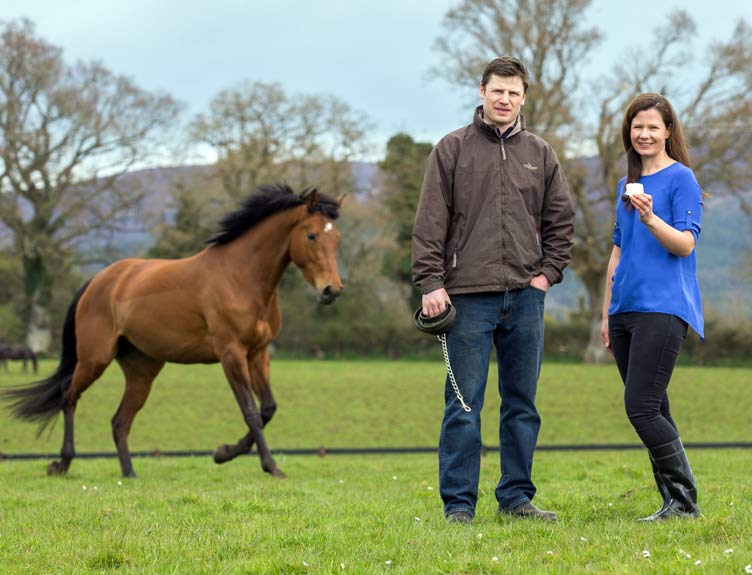Cartilage repair technology helps injured thoroughbred horse return to show-jumping

New research from RCSI and the Science Foundation Ireland funded research centre, AMBER (Advanced Materials and BioEngineering Research) published today in the Journal of Tissue Engineering & Regenerative Medicine has found that a novel biomaterial that can repair damaged knee cartilage has led to an injured thoroughbred filly, Beyoncé returning to competitive show jumping following implantation of this biomaterial.
This patented multi-layered 3D porous scaffold called ChondroColl, was developed by a team of researchers from the RCSI Tissue Engineering Research Group (TERG) and the Advanced Materials and BioEngineering Research (AMBER) Centre led by Professor Fergal O'Brien. It is composed of layers of collagen, hydroxyapatite and hyaluronic acid, materials native to articular joints, and is designed to direct the body's own cells to regenerate damaged joints, thus presenting a potential solution that can benefit patients worldwide.
This is the third research paper published in 2016 by the group which has demonstrated the ability of ChondroColl to repair cartilage and joint defects. This most recent study relates to a recent case in University College Dublin's (UCD) Veterinary Hospital and provided the first clinical use of this scaffold. The patient was a 16 month old thoroughbred filly - ‘Beyoncé', who had large areas of damage in both left and right stifle (knee) joints as a result of a disease known as osteochondritis dissecans (a joint disorder in which cracks form in the articular cartilage and the underlying subchondral bone). The outcome for such patients is often poor and may lead to euthanasia of the animal in severe cases.
David Stack and Florent David of UCD's Veterinary Hospital carried out the removal of the unstable osteochondral fragments and subsequently the multi-layered scaffolds were then implanted providing a template for new cartilage and bone to be formed. The procedure was very successful and since surgery, ‘Beyoncé' has resumed training and will compete in show jumping events in the coming months.
Additional healing assessment research reported for ChondroColl has also received promising results. The first from a short term pilot study was published in Acta Biomaterialia and the second was a long term pre-clinical study, also carried out in conjunction with University College Dublin's School of Veterinary Medicine, which has demonstrated the ability of the scaffold to heal defects at 12 months in goats. This was recently published in Biomaterials, the leading specialist journal in the field.
Professor Fergal O'Brien, Head of the Tissue Engineering Research Group in the Dept. of Anatomy in RCSI and Deputy Director of AMBER, said: "We are delighted with the outcomes from both pre-clinical studies and particularly with the results from the Beyoncé case. Our hope for the future is this technology will benefit human patients and through our spinout company SurgaColl Technologies, this is very close to becoming a reality with first human cases anticipated in the coming months."
Dr Tanya Levingstone, first author on the studies, Research Fellow and Honorary Research Lecturer in RCSI, said: "These studies were an interdisciplinary team effort and has shown potential of the biomaterial to heal different sized injuries in patients."
ChondroColl repairs articular joints by stimulating host stem cells to regenerate both bone and cartilage, using the composition and architecture of the biomaterial to actively direct tissue formation. The research related to the development and assessment of the technology received funding from Enterprise Ireland, Science Foundation Ireland and the Health Research Board. A High Potential Start-Up company from RCSI, SurgaColl Technologies, are currently bringing the technology to market. This is the second product from RCSI in SurgaColl's pipeline. Their first product, a bone regeneration scaffold (HydroxyColl) is CE approved. Regulatory approval and first in-human use of the ChondroColl scaffold is planned in the coming months.
Professor Michael Morris, Director of AMBER, said: "Today's announcement on the new technology demonstrates our track record of pushing the boundaries of science to discover real solutions for people. We will continue to carry out excellent research that has real societal impact. In addition, to improving the lives of thousands of people, this technology could have real applications in the veterinary sector."
About AMBER
AMBER (Advanced Materials and BioEngineering Research) is a Science Foundation Ireland funded centre which provides a partnership between leading researchers in materials science and industry to develop new materials and devices for a range of sectors, particularly the ICT, medical devices and industrial technology sectors. The centre is hosted in Trinity College Dublin, working in collaboration with CRANN (Centre for Research on Adaptive Nanostructures and Nanodevices), the Trinity Centre for Bioengineering and with University College Cork and the Royal College of Surgeons of Ireland.
About SurgaColl
SurgaCollTM Technologies is an Irish medical device company supplying novel tissue regeneration products for the surgical treatment of disease of the bone, cartilage and other human tissue, based on technologies developed by the Tissue Engineering Research Group (TERG) at the Royal College of Surgeons in Ireland. SurgaColl's first CE marked product, HydroxyColl is an exciting new bone graft substitute that offers bone healing equivalent to patient' own bone when used as a medical implant in the treatment of bone defects. SurgaColl's second product, ChondroColl, is an early-intervention product that can regenerate cartilage and delay the onset of arthritis and the need for joint replacement.



